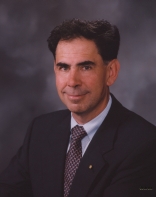The Augustine Report, Rationale and Retrospective
Edward F. Crawley
TUESDAY: September 14, 2010 2:00 P.M. in the H.J.E. Reid Auditorium
(video) within the Langley firewall only
Abstract
The nation is facing important decisions on the future of human spaceflight. Will astronauts leave the close proximity of low-Earth orbit and explore the solar system, charting a path for the eventual expansion of human civilization into space? If so, how will we ensure that our exploration delivers the greatest benefit to the nation? Can we explore with reasonable assurances of human safety? And, can the nation marshal the resources to embark on the mission?
In part to answer these questions, the White House and NASA chartered the U.S. Human Spaceflight Plans Committee, chaired by Norm Augustine, in the summer of 2009. The specific task of the Committee was to identify and evaluate options for the future of the program. These options were summarized in the final report of the Committee, submitted to the President in October 2009. Planning for a human spaceflight program should begin with a choice about its goals. Destinations should derive from goals, and alternative architectures may be weighed against those goals.
The lecture will review the goals, decision criteria, options and alternatives defined by the Augustine Committee, and their rationale. Then it will trace, to the extent possible, how these findings have influenced the subsequent debate.
Speaker
 Edward F. Crawley is the Ford Professor of Engineering at MIT, and is a Professor of Aeronautics and Astronautics and of Engineering Systems. He received an S.B. and Sc.D. in Aerospace Engineering from MIT. He has served as the Department Head of Aeronautics and Astronautics at MIT, the Executive Director of the Cambridge – MIT Institute, and currently serves as the Director of the Bernard M. Gordon – MIT Engineering Leadership Program. His research focuses on the domain of architecture, design and decision support in complex technical systems that involve economic and stakeholder issues. Dr. Crawley is a Fellow of the AIAA and the Royal Aeronautical Society (UK), and is a member of three national academies of engineering: in Sweden, the UK and the US. He has served as chairman of the NASA Technology and Commercialization Advisory Committee, and was a member of the 1993 Presidential Advisory Committee on the Space Station Redesign, and the 2009 U.S. Human Spaceflight Plans (Augustine) Committee. He recently co-chaired the NRC committee reviewing the NASA Exploration Technology Development Program. He was a visiting lecturer at the Moscow Aviation Institute, and is a Guest Professor at Tsinghua University in Beijing. He was a finalist in the NASA Astronaut selection in 1980. In 2004 he received the Distinguished Eagle Scout Award of the Boy Scouts of America. He has founded three entrepreneurial companies, and currently sits on several corporate boards.
Edward F. Crawley is the Ford Professor of Engineering at MIT, and is a Professor of Aeronautics and Astronautics and of Engineering Systems. He received an S.B. and Sc.D. in Aerospace Engineering from MIT. He has served as the Department Head of Aeronautics and Astronautics at MIT, the Executive Director of the Cambridge – MIT Institute, and currently serves as the Director of the Bernard M. Gordon – MIT Engineering Leadership Program. His research focuses on the domain of architecture, design and decision support in complex technical systems that involve economic and stakeholder issues. Dr. Crawley is a Fellow of the AIAA and the Royal Aeronautical Society (UK), and is a member of three national academies of engineering: in Sweden, the UK and the US. He has served as chairman of the NASA Technology and Commercialization Advisory Committee, and was a member of the 1993 Presidential Advisory Committee on the Space Station Redesign, and the 2009 U.S. Human Spaceflight Plans (Augustine) Committee. He recently co-chaired the NRC committee reviewing the NASA Exploration Technology Development Program. He was a visiting lecturer at the Moscow Aviation Institute, and is a Guest Professor at Tsinghua University in Beijing. He was a finalist in the NASA Astronaut selection in 1980. In 2004 he received the Distinguished Eagle Scout Award of the Boy Scouts of America. He has founded three entrepreneurial companies, and currently sits on several corporate boards.